Table of Contents
In an era where social media has become an integral part of our daily lives, we are all aware of the enormous impact it has on both personal and business realms.
However, behind the scenes of this digital revolution, there exists a professional figure playing a crucial role in managing and guiding the online presence of companies: the Social Media Manager.
The Social Media Manager indeed holds a strategic and influential position in defining and redefining how businesses and professionals interact with the vast digital audience. With their skills, this professional becomes a successful architect for the online presence of companies, contributing to building a positive reputation and promoting the company’s products and services.
Social Media: The Digital Agora
Social media represent the pulsating heart of our digital society, a connective fabric weaving relationships between individuals, communities, and businesses. Platforms like Facebook, Instagram, Twitter, and LinkedIn serve as true digital agoras, where the incessant flow of information, opinions, ideas, images, and experiences creates unprecedented dynamism.
These platforms are not mere communication tools; they are virtual squares where the world meets to share, discuss, and connect. The speed at which news spreads and ideas take shape is astonishing, creating an intricate network of interactions that transcends geographical and cultural boundaries.
The impact of social media on society and the economy is profound, facilitating unprecedented global communication and opening doors to unique opportunities for visibility and interaction.
Aware of this ever-evolving landscape, businesses shrewdly leverage social media as key tools to build and solidify their brands. In this intricate digital dance, the social media manager emerges as the strategic director, guiding businesses through the complex dynamics of platforms and maximizing their potential. Their in-depth knowledge of these dynamics becomes the helm steering the company toward success in the vast sea of social media.
The social media manager, the architect of this digital strategy, is tasked with shaping and implementing an effective vision on social media. From corporate goals to market trends, every move is carefully considered.
The creation of engaging and relevant content becomes their work of art, channeling user energy to increase the company’s visibility. In this intricate digital game, constant monitoring of campaign results becomes an analytical symphony, guiding the social media manager to targeted adjustments to optimize outcomes.
In the digital kaleidoscope, building a strong social media presence requires an explosive mix of creativity and flexibility. Platforms and trends change like the seasons, and the social media manager must be ready to adapt to evolutions and seize new opportunities on the fly. In this intricate digital ballet, the social media manager emerges as the architect of a robust and dynamic digital presence, capable of navigating the tumultuous waters of social media with agility and mastery.
In this intricate digital landscape, social media emerge as a reflective mirror of social and cultural dynamics, a fertile ground for creativity, but also a complex stage that requires wisdom and expertise to be fully leveraged.
The Social Media Manager as a Pillar of the Brand
If asked to do so, we could define the role of the Social Media Manager as a multifunctional professional figure with multiple responsibilities; at the same time, we could also precisely outline his duties within a company.
In fact, we could assert with certainty that he will be responsible for:
- Brand Awareness and Corporate Reputation: by increasing the visibility of the company he manages through social channels and through the use of engaging content. This means creating and sharing posts, videos, images, or other types of content that can capture the audience’s attention and effectively communicate the company’s message.
- Online Presence and Lead Generation: the Social Media Manager will be responsible for planning targeted advertising campaigns on social media. This implies defining a specific target audience to address advertising messages, using targeting tools offered by social platforms themselves with the goal of reaching the right audience and gaining more visibility and interactions for the company.
- Engagement with the Audience: the social media manager will handle managing interactions with the audience, responding to comments, private messages, or other types of feedback, building strong relationships with users that will help in brand or company loyalty.
It is always essential to remember that to outline, develop, and implement successful strategies on social media and in the digital world in general, it is necessary to consider fundamental points:
- Accurate analysis of the target audience of the company to avoid addressing an uninterested audience in us and what we promote;
- Definition of objectives to be achieved through social media to avoid wasting time and energy;
- Creation of content in line with these objectives, aiming to create a cohesive strategy aligned with corporate goals;
- Analysis of metrics by monitoring data related to engagement such as the number of likes, comments, and shares, the reach of publications, the number of followers acquired over time, and other key indicators. It is through the analysis of these metrics that the Social Media Manager can understand the progress of the implemented strategy, make any corrections or improvements, and demonstrate the value of the activities carried out in relation to the company’s objectives.
In summary, the Social Media Manager can be interpreted as the digital spokesperson of the company because it is up to him to manage the image and online reputation of the company. He does this by responding to reviews, addressing criticisms or controversies, and striving to maintain a positive reputation on the web. All of this allows him to build trust and credibility for the company with the online audience.
Social Media Manager: Technical Skills and Soft Skills
As mentioned earlier, the Social Media Manager is responsible for planning, strategy, and goal setting in social media activities.
If we delve into the technical aspects of his role, one of the key skills of the Social Media Manager is the creation of engaging content, including videos, following current trends such as Instagram reels, YouTube shorts, and TikTok content.
As one can easily infer, the Social Media Manager of 2023 must possess creative abilities to translate stories into images and words, graphic skills, the ability to use the most important social media platforms, knowledge of current fashions and trends, and, not least in importance, the ability to identify the target audience and manage interactions with users.
Other fundamental skills include the ability to manage public speaking for events that may involve the company. His advanced knowledge of SEO will enable him to optimize the online visibility of the company, contributing to inbound traffic generation.
It is crucial for the Social Media Manager to keep up with the trends and new features of social media platforms, in order to make the most of the opportunities offered by these platforms. Furthermore, he must have good communication and writing skills to create engaging and persuasive content for the online audience.
Platform management is another important responsibility of the Social Media Manager. He must be able to make the best use of various social media platforms, such as Facebook, Instagram, Twitter, LinkedIn, TikTok, etc., and manage content publishing, user interaction, and performance analysis to assess the effectiveness of implemented strategies.
Performance analysis is a fundamental part of the Social Media Manager’s work. Through careful monitoring of metrics and social media analyses, he will have the opportunity to evaluate the results obtained and make any necessary changes to the implemented strategy. This analytical ability is crucial to ensure that social media campaigns are effective and produce tangible results for the company.
Social Media: A Matter of Strategy
To grasp the importance of strategic planning, one only needs to envision the online presence as an exciting journey, and a well-defined social strategy is the map that outlines the path to success.
In the world of digital marketing, this thorough planning is not just a plus; it is the true engine that determines the achievement of goals on social media.
A good and well-planned marketing strategy allows for the creation of meaningful connections with the audience, building trusting relationships to ensure that users become potential loyal customers, always intrigued.
Social media is like the stage where your brand performs. Here, you can build relationships, receive applause in the form of feedback, and make those changes that continually improve your products or services.
But how do you build this epic social strategy? It’s not just a wishlist; it’s an engaging process. You need clear goals, including:
- a close look at your competitors,
- a thorough analysis of your audience,
- the wise choice of the right social channels and a tone of voice that sounds like your target audience’s favorite melody.
In short, planning a social strategy is the secret key to growing traffic, improving sales, and painting a positive picture of your brand in the digital landscape.
What needs to be taken into account is that each social platform has its own timing and posting techniques, crucial for achieving the set objectives.
Practice Management Software for Various Social Platforms
We have searched and identified useful platforms for social media management, listing their features below:
Later

Later is practically your personal assistant for social media, all in one. You can plan, publish, and analyze everything on platforms like Instagram and TikTok, and more.
With Later, you can create and edit your posts whenever you want, to keep your content fresh and organized. And then, there’s this thing called Linkin.bio that turns your followers into potential customers, directing traffic to websites, online stores, or blogs, all starting from the Instagram and TikTok bios.
To understand if you’re hitting the mark, they have analytical tools that are like magic – measuring the effectiveness of your content without driving you crazy with complicated calculations. They help you understand what works best, without stress.
And when it comes to creating content, searching for branded stuff is easy and fast, and they have creative tools to organize and edit everything so that your brand image is always on top.
The website has a blog full of tips to improve your social strategy. And if you need support or want to chat with other users, there’s also a help center and a community ready to assist you. They mainly focus on Instagram and have a drag-and-drop calendar to make scheduling a breeze, along with an included stock photo library.
PostPickr
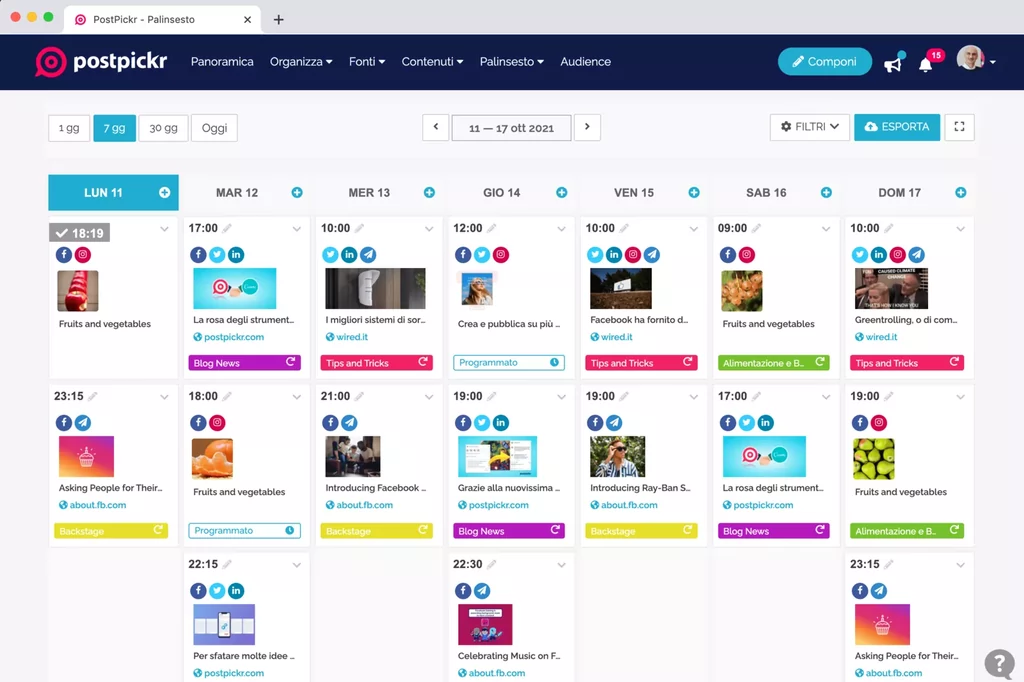
PostPickr is truly a top tool for managing your social media, full of features and benefits that simplify your life. For example, you can manage all your accounts on Facebook, Instagram, TikTok, Twitter, LinkedIn, YouTube, Google My Business, Pinterest and Telegram, all from one app! And the really cool part? It uses artificial intelligence to generate texts and images for your posts. You can schedule your posts according to your editorial plan or have them go out automatically following the topics.
And if you’re working in a team, no worries! With PostPickr, you can create editorial projects, share everything with your colleagues, assign roles, and review content before it goes live. And let’s not forget about the performance analysis part – you can understand what works best, your audience’s interests, and everything else.
Crowdfire
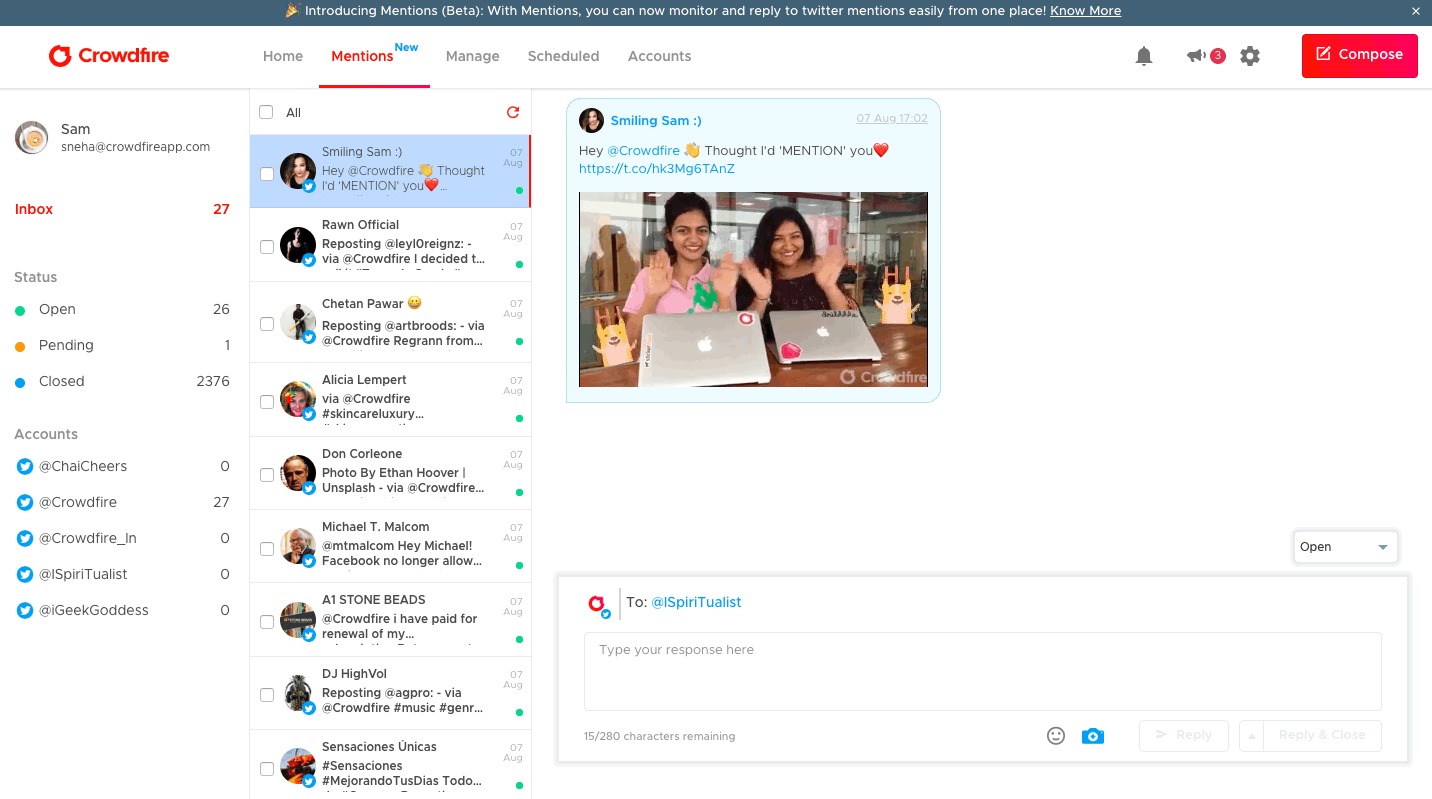
Crowdfire is the social media management tool, perfect for everyone, from businesses to individual social media enthusiasts.
With Crowdfire, you can discover new and interesting content tailored to your tastes. It’s like having a personal assistant suggesting cool things for you. Not only that, but you can also schedule your posts in advance, avoiding the need to always be attentive to the right moment.
Imagine managing all your social media accounts from one place. With Crowdfire, you can do just that.
When you need visual inspiration, Crowdfire has you covered. You can find fantastic images that match your interests.
If you like staying updated on specific news, you can add your RSS feeds to have the latest updates at your fingertips.
Crowdfire may offer various subscription options, each with its own features and limitations. Before making your move, think carefully and choose the plan that best fits your needs or those of your business.
Sendible
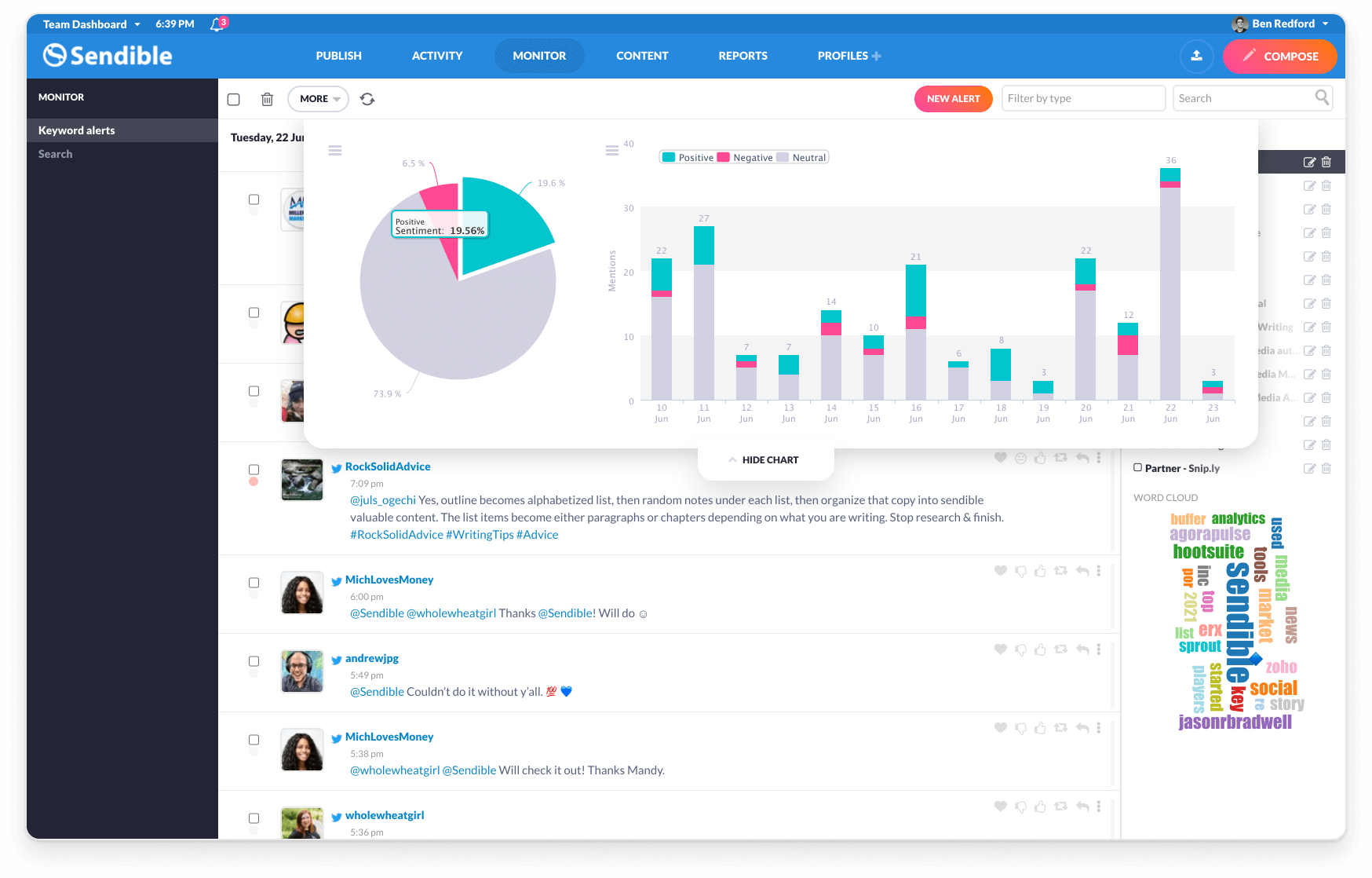
Sendible is an advanced platform for serious online social media management, perfect for agencies and brands.
With Sendible, you can manage social media on a large scale, such as scheduling, monitoring, and reporting on activities across different channels without too much stress.
Thanks to its bulk importer, you can plan a month’s worth of content in minutes and customize it with labels, locations, and hashtags.
If you’re lacking ideas for posts, no worries! Sendible has a holiday calendar, automatic RSS feeds, and Google alerts to help you find interesting content quickly.
The best part is that you can customize your posts with content from GIPHY, Pexels, or Canva, all with their integrated image editor. In short, you can make them your own!
Collaborating with clients is easy with Sendible. You can securely integrate them into your dashboards without having to share passwords, allowing them to approve content directly from the platform.
Additionally, Sendible generates automatic reports, showing you the results of your campaigns so you can refine your strategy.
For those who want a personalized touch, there’s a white-label dashboard that you can brand however you like. Plus, the pricing is affordable, with no mandatory contracts.
They have subscription plans that grow with you, perfect for agencies looking to dominate the social media world.
SocialGest
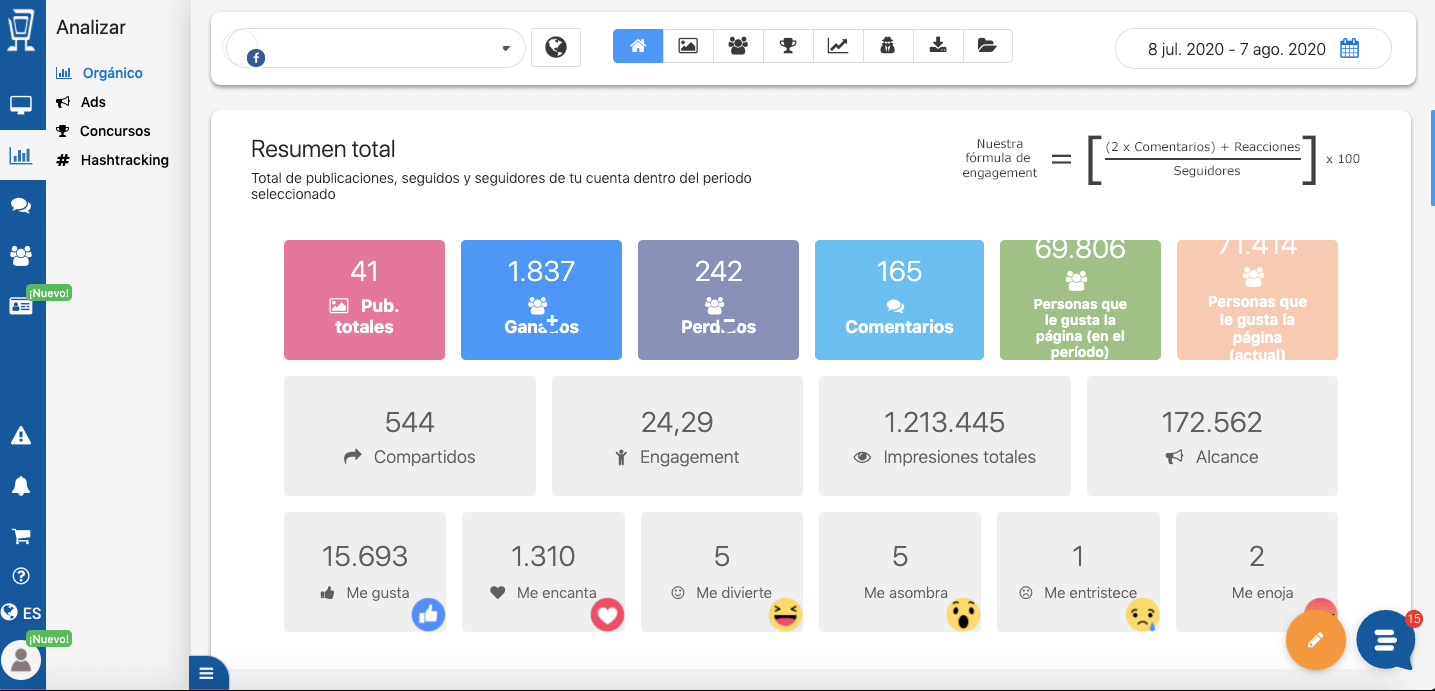
SocialGest is a social media management platform that provides everything you need to take your online presence seriously.
Imagine being able to plan and automate your posts on all social media platforms without stress. With SocialGest, you can do just that and even have content calendars to keep everything organized.
If you enjoy analyzing numbers, this tool gives you access to customizable charts for all KPIs on virtually every platform: Instagram, Facebook, LinkedIn, Twitter, YouTube, Pinterest, TikTok, and even Telegram.
They have an AI-based copywriting feature.
And if you want to organize social media contests on platforms like Instagram, Facebook, and Twitter, they have everything under control. You can also choose winners based on comments on posts.
Additionally, you can define a team to manage specific social networks and use their client scheduler to do everything in an organized manner.
In terms of costs, they have plans ranging from Junior to Enterprise. Check their website for all the details.
Social Media in the Current Context
To gather some statistics regarding the usage of major social media platforms, we turned to Our World in Data.
Various statistics confirm the obvious ascent that has characterized the world of social media.
None of us today live our days without consulting, scrolling, and exploring on at least one of these platforms.
If we consider the following graph, we can observe how these platforms engage American users of all ages.
‘To each their own’ would be the ideal motto to briefly outline current trends regarding age and gender.
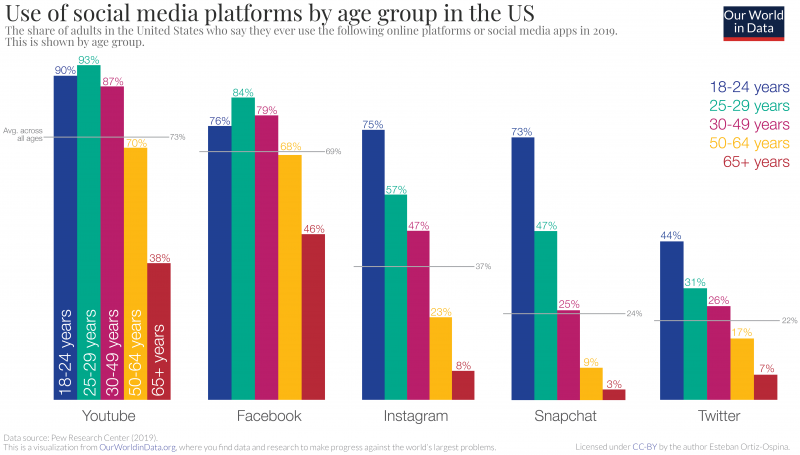
It is in this other graph that we notice how the gender difference also influences the use of various social media.
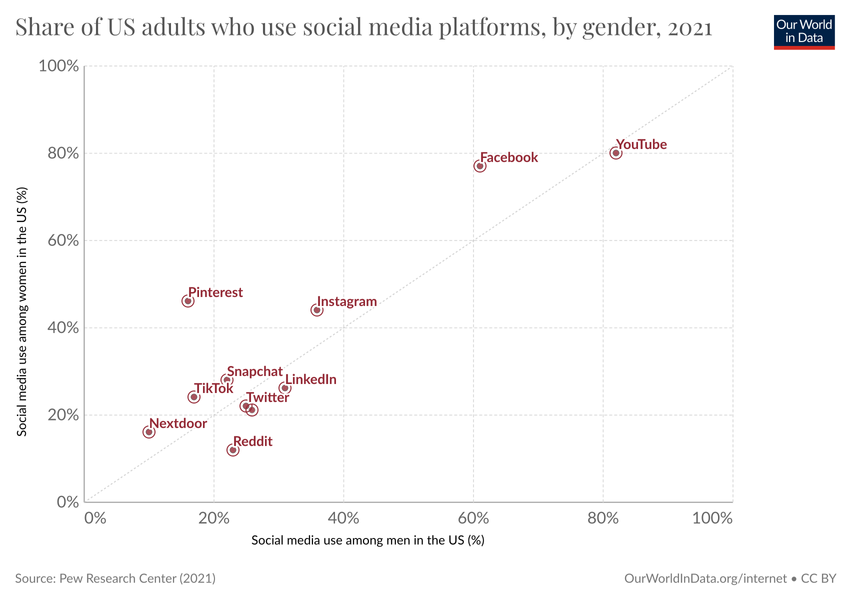
Educational Path and Advice: How to Become a Social Media Manager
To become a successful Social Media Manager, it is advisable to dedicate oneself to the study of communication and marketing in the digital world through degree programs, master’s degrees, or advanced courses. Acquiring specific skills such as knowledge of social media marketing techniques is essential to work efficiently on social networks.
We recommend reading:
- https://www.amazon.it/Professione-Strategie-strumenti-professionisti-marketing/dp/8820393174/ref=cm_cr_arp_d_product_top?ie=UTF8 di Veronica Gentili
Conclusions
In conclusion, the Social Media Manager is a key figure within a company, responsible for the strategic management of social media. Their role includes creating engaging content, managing interactions with the audience, planning targeted advertising campaigns, and analyzing metrics to assess the effectiveness of adopted strategies. Moreover, the Social Media Manager is the guardian of the company’s image and online reputation, contributing to building a positive and reliable brand.
For these reasons, they are an indispensable figure within any company aiming for success.
